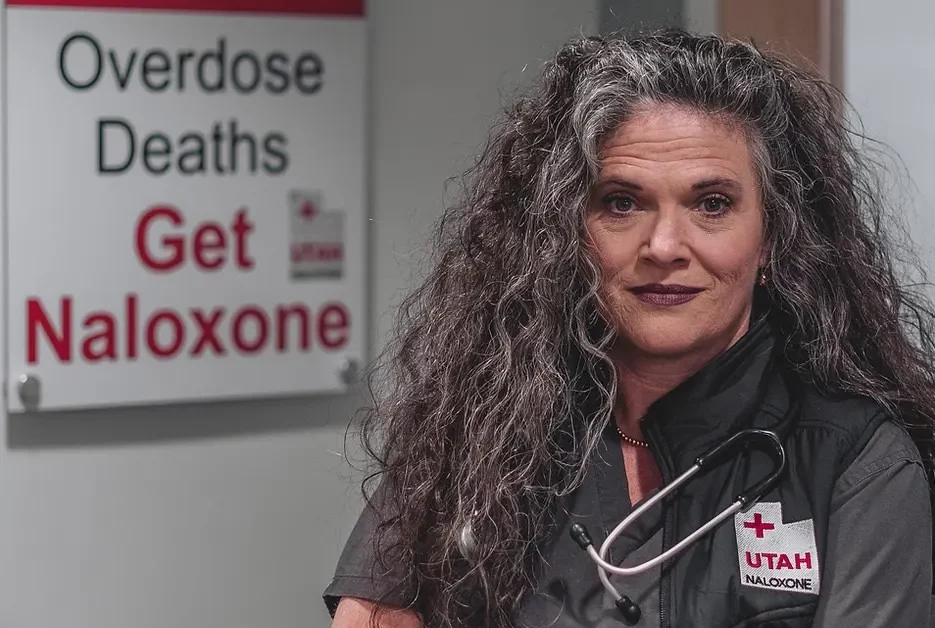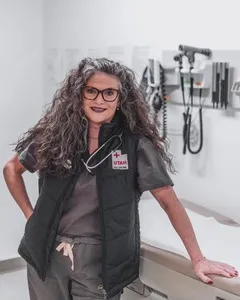
Senator Jennifer Plumb Knows Accessible Naloxone Can Save Lives In Utah
Activism, Outreach and Education
Seventeen-year-old Jennifer Plumb swore she would never return to Utah when she graduated from East High School. But even though her studies took her to Los Angeles and Indiana, she kept finding herself called back to the community and landscape of her home state. Today, Physician and Senator Plumb is one of the state’s most prolific leaders, serving as co-founder of the nonprofit Utah Naloxone alongside her brother, Sam Plumb, and fighting for equality and equity for marginalized communities in the Utah State Senate.
“I get to hold a microphone that many others should be holding,” she says. “So it’s my responsibility to speak on behalf of and for those people.” Plumb’s career in state politics may be nascent—she was elected in 2022 and started her term as state senator just last year—but her and her family’s active involvement in advocacy has left a profound impact on Utah since 1996, when her brother died from a heroin overdose. “How you find peace out of pain is different for all of us,” she says.
“We were primed to come back to Utah and do policy. We wanted to get naloxone kits out anywhere and everywhere, not just [at] the doctor’s office or the pharmacy.”

At the time of her brother’s death, addiction was still widely stigmatized, making her work to bring awareness to the disease all the more difficult. But the Plumb family continued to have tough conversations with neighbors and legislatures while Plumb leveraged her trust within the pediatric department at the University of Utah to tackle substance use, abuse and prevention.
She began applying for grants, such as the Community Access to Child Health (CATCH) grant from the American Academy of Pediatrics that she and her brother Sam would dedicate to their cause, ultimately championing naloxone, the opioid overdose reversal commonly referred to by the brand name Narcan. By 2015, Utah Naloxone’s founding year, their work scored them an invite to an FDA briefing for naloxone in public spaces.
“We were primed to come back to Utah and do policy,” says Plumb. “We wanted to get naloxone kits out anywhere and everywhere, not just [at] the doctor’s office or the pharmacy.” In the past decade, Utah Naloxone has helped pass statewide orders so that any individual in Utah has the tools, resources and training to administer naloxone anywhere, in addition to a series of Good Samaritan and harm reduction laws such as safe syringe exchanges. The impressive partnership between Utah Naloxone and state policymakers is a huge reason why Utah is scheduled to receive nearly $300 million in opioid settlement funds. “These are the policies I wish made front page news,” she says. “Instead, we bicker about bathrooms.”
“I get to hold a microphone that many others should be holding,” she says. “So it’s my responsibility to speak on behalf of and for those people.”
Continuing to witness bipartisan support for Utah Naloxone’s efforts and policy recommendations motivated Plumb to run for office. “We spend so much time being polarized,” she says. “But there are policies that are really changing communities and saving lives that we don’t nearly spend enough time talking about.”
Plumb believes we often overlook the realistic ways in which we can support people, especially those who are, unfortunately, “never treated as equals,” such as unsheltered individuals, those struggling with substance abuse and Utah’s transgender community. She endorses laws she believes will create a tangible effect—stable housing, affordable medication and improved public transportation—ensuring greater opportunity is assured to the state’s most vulnerable populations.
Today, ten Utah adults die every week from drug overdoses, according to Utah’s Indicator-Based Information System for Public Health (IBIS-PH). Plumb is proud of what Utah Naloxone has accomplished thus far, but she’s keen on “staying engaged and progressive on this,” she says. Utah Naloxone welcomes anyone looking to volunteer or learn more about the cause, including joining virtual naloxone administration training and gathering at community events to build naloxone kits.
“Whether you want to carry naloxone or carry conversations, anywhere you can be a part of that positive change is crucial,” she says. “It’s on us to embrace the people who are living through stuff that we might not understand but still care like hell about.” Get involved at utahnaloxone.org.
Read more interviews with community leaders:
Love Letters to the West Side: Celebrating the Roots We Hold Close
DesignBuildBluff: Collaborative Homebuilding in the Navajo Nation